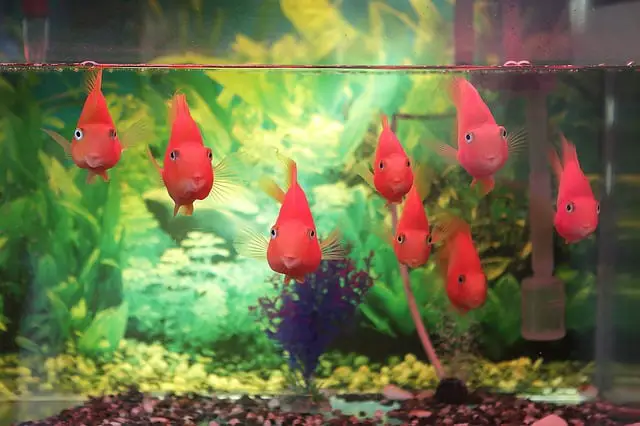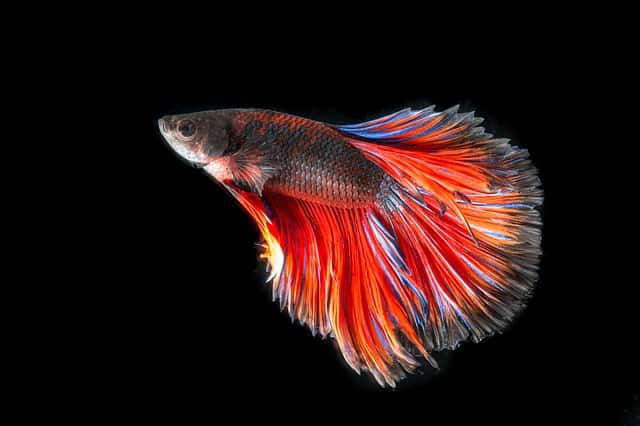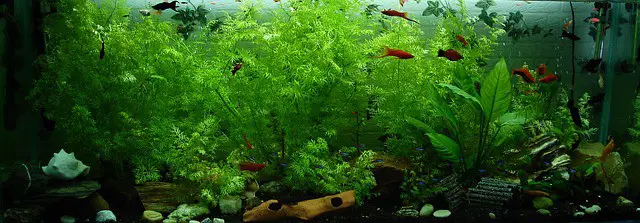In the world of saltwater aquariums, maintaining optimal water quality is crucial to the health and well-being of marine life. One key aspect of ensuring pristine water conditions is the use of RO (Reverse Osmosis) water.
This article explores the significance of using RO water for saltwater tanks and highlights its numerous benefits. Whether you’re a seasoned aquarium enthusiast or a beginner venturing into the marine hobby, understanding the importance of RO water will undoubtedly lead to a successful and thriving aquarium.
Understanding RO Water
Reverse Osmosis is a process that removes impurities and contaminants from water, ensuring high purity and quality. In the context of saltwater aquariums, it becomes essential because tap water often contains various elements that are harmful to marine life.
RO units use a semi-permeable membrane to filter out unwanted substances, leaving behind pure water that serves as an ideal foundation for a healthy aquatic environment.
Additionally, there’s the RO/DI (Reverse Osmosis and Deionization) unit which includes an extra deionization stage to further purify the water, making it even more suitable for delicate marine organisms.
Benefits of RO Water for Saltwater Tanks
A. Purity and Consistency
RO water provides an unmatched level of purity and consistency, ensuring that your saltwater aquarium maintains an environment free from contaminants and pollutants. Without these impurities, the water remains clear, promoting excellent visibility of your marine ecosystem.
Furthermore, the absence of unwanted substances discourages algae growth, preventing the common problem of algae blooms that can disrupt the balance of the aquarium.
B. Optimal Salinity Control
Maintaining the proper salinity level is crucial for the health and survival of marine life. With RO water, aquarium owners can precisely control and adjust salinity to match the specific needs of their marine organisms.
This level of control allows for a stable environment, reducing stress on the inhabitants and minimizing the risk of health issues associated with fluctuating salinity levels.
C. Reducing Nitrates and Phosphates
Excessive nitrates and phosphates in aquarium water can lead to harmful consequences for fish and corals. RO water effectively reduces the presence of these compounds, preventing potential harm and enhancing the overall water quality.
By using RO water, aquarium owners can significantly decrease the frequency of water changes and reduce the need for additional chemical treatments, ensuring a healthier and more balanced marine ecosystem.
D. Safer for Sensitive Marine Species
Certain marine species, particularly corals and invertebrates, are highly sensitive to changes in water chemistry. These delicate organisms require stable and low-TDS (Total Dissolved Solids) water conditions to thrive.
RO water provides the optimal environment for these sensitive species, helping them grow and flourish in the aquarium. Additionally, many fish species from delicate ecosystems like reef environments also benefit from the pristine conditions offered by RO water.
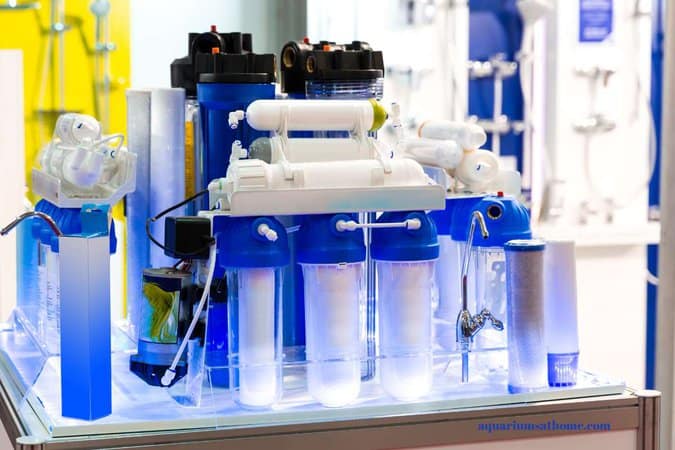
RO Units vs. RO/DI Units: Which One to Choose?
When considering the type of RO system to invest in, aquarium owners often wonder whether to go with a standard RO unit or an RO/DI unit. The decision depends on your needs and priorities. Standard RO units are effective at removing most contaminants but RO/DI units offer an extra level of purification, ensuring the cleanest water possible.
If budget permits, investing in an RO/DI unit is highly recommended, especially for advanced reef systems or when keeping particularly sensitive species.
However, standard RO units can still provide excellent water quality for a wide range of saltwater aquarium setups.
Proper RO Water Handling and Storage
To maintain the purity and quality of RO water, proper handling and storage are crucial. Always use clean containers when collecting and storing RO water to avoid contamination. Additionally, ensure that the containers are designated solely for holding RO water to prevent cross-contamination from other substances.
Store the water in a cool, dark place, away from direct sunlight and potential sources of pollutants.
Maintenance and Upkeep of RO Units
RO units require regular maintenance to function efficiently and provide consistent high-quality water. Routine filter changes are essential to prevent clogs and maintain optimal filtration performance. Cleaning and sanitizing the unit periodically ensure that it operates at its best capacity.
Check the unit’s manufacturer guidelines for recommended maintenance schedules and procedures to ensure a long-lasting and reliable RO system.
How to Perform Water Quality Tests with RO Water
Once you’ve installed an RO unit and setup your saltwater aquarium, it’s crucial to monitor water quality regularly. Performing water quality tests allows you to identify any fluctuations or potential issues in the aquarium.
Conduct tests for parameters such as pH, ammonia, nitrite, nitrate, and alkalinity to ensure the water remains within safe and optimal levels.
Regular monitoring enables prompt action in case of any deviations, preventing potential harm to your marine life.
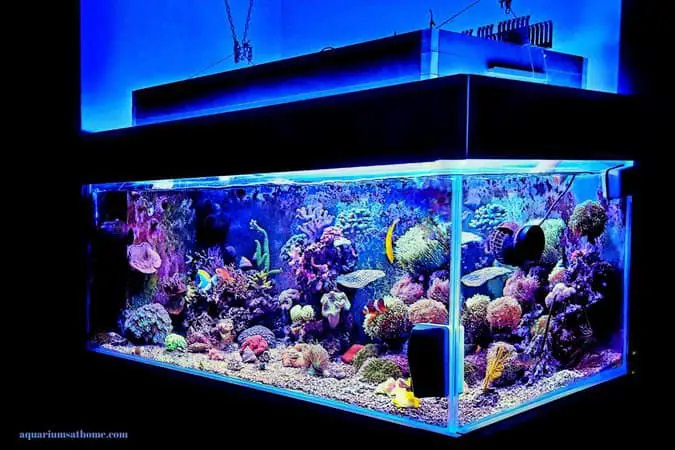
Using RO Water for Reef Aquariums
Reef aquariums, with their diverse array of corals and invertebrates, demand exceptional water quality. RO water plays a pivotal role in creating the stable, low-TDS environment necessary for a successful reef tank.
The absence of contaminants and pollutants ensures the delicate coral polyps and other reef inhabitants can flourish, displaying their vibrant colors and intricate beauty.
Additionally, RO water’s purity contributes to the overall stability of the reef ecosystem, fostering natural processes and nutrient cycling.
Balancing RO Water with Essential Trace Elements
While RO water’s purity is advantageous, it can lack certain essential trace elements that marine organisms require. To maintain a thriving saltwater aquarium, it’s crucial to supplement the RO water with necessary trace elements and minerals.
Using a high-quality marine salt mix allows you to introduce these vital elements back into the water, creating a balanced and nutrient-rich environment for your marine life.
The Environmental Impact of RO Water
As responsible aquarium keepers, it’s essential to consider the environmental impact of using RO water. RO filtration processes require energy and discarded wastewater can be a concern.
However, with proper usage and water-saving practices, the environmental footprint of RO water can be minimized. Additionally, recycling wastewater for other non-potable uses can help reduce wastage.
Why Invest in an RO/DI Unit Now?
Now that you’ve learned about the remarkable benefits of RO water for your saltwater aquarium, it’s time to act. Investing in an RO/DI unit is a proactive step that can significantly enhance the health and vibrancy of your marine ecosystem.
By clicking the link provided and setting up an RO only or RO/DI unit sooner rather than later, you’ll fast-track the process of achieving the ideal water conditions for your aquarium.
The earlier you have it in place, the quicker your tank will thrive with the cleanest and healthiest water possible. Don’t delay – ensure the well-being of your marine life today!
Here are some excellent RO/DI systems to hook up to your saltwater tank.
Conclusion
In conclusion, the use of RO water for saltwater aquariums offers numerous benefits that contribute to the success of your marine hobby. The purity and consistency of RO water create a healthier environment for your marine life, allowing them to thrive and display their natural beauty.
By maintaining optimal salinity levels and reducing nitrates and phosphates, RO water fosters a balanced and sustainable ecosystem. Moreover, for those keeping sensitive marine species, RO water becomes an indispensable asset for their well-being and growth. 9
Incorporating RO water into your saltwater aquarium is a testament to your commitment to providing the best possible care for your marine life. By following the guidelines outlined in this article, you can create a thriving, vibrant, and captivating marine ecosystem that brings joy and wonder to both you and your marine inhabitants.
So, take the first step toward creating an aquatic masterpiece by choosing RO water (or RO/DI water) for your saltwater tank. Happy reef-keeping!



